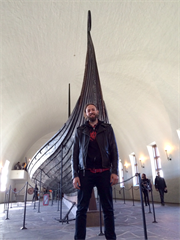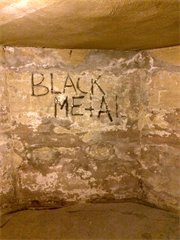
Me in at the Viking ship museum in Olso.

The cellar of the rather infamous "Helvete" record shop that served as the meeting place for black metal devotees.
The question of why I came to Sweden is usually one of the first things people ask when I meet them. While this might seem like a simple question to answer, the reasons behind why I came to Sweden to study Norwegian black metal are not as straightforward as they may seem. So, it is with this question that I will begin my blog week. Over the course of these five blog posts I will not just discuss my research, but will also attempt to convey the unique opportunities and insights the humanities have to offer society.
However, before I begin it is perhaps best to introduce myself. My name is Christopher Thompson and I am a doktorand at the history department of Uppsala University. I grew up and lived in a number of different American cities so it is hard to say precisely where I’m from, but perhaps it’s enough to say that I am an American who is more or less from the Mid-Atlantic region. I completed my bachelor’s degree at Binghamton University and my masters at Uppsala University. My master’s thesis dealt with the different ways history is used by Norwegian black metal and now my current research deals with the same topic in a more expansive way. I will save the specifics of my research for later and will begin with a bit of background about myself.
For as long as I can remember, history has been not just an interest centered in the classroom, but has been a major occupier of my free time. Whether it was historically based board games with my father or obsessively watching historical documentaries and programs on television, history has been a key interest of mine since a very young age. Pursuing history as a profession was something that never felt forced or like some sort of singular option. After finishing my bachelor’s degree in the spring of 2008, I was hired by a well-known popcorn company. The job had little to nothing to do with my undergraduate studies of history and German, but I took the job nonetheless as finding employment directly after graduation in early 2008 was not a guarantee.
The time spent working at this popcorn company as a logistics manager was educational in its own right. Shortly into my brief employment there I realized that continuing my education was a necessity. This was not because the rigors of the job were in any way demanding or a challenge, indeed it was far from the case. Rather, I realized that the work I was doing was deeply unsatisfying and that I yearned for the student life. I missed studying, reading and writing about history and it was sorely absent in my day-to-day duties as a logistics manager. So, when the time came I began applying for master’s programs focusing on history.
When searching for different master’s programs, my first choices were all based outside of the United States, mostly concentrated in Scandinavia. While there was a degree of pragmatism in this decision, free tuition at the time and English-taught master’s programs, the underlying motivation was rooted in a promise I had made to myself after completing my bachelor’s degree. During my bachelor’s studies I had studied abroad as part of an exchange with Karl-Franzens Universität in Graz, Austria. My initial study period was only one semester, however the time proved to pass so quickly that I felt like I was missing out on so much I had yet to experience. It was an easy decision to extend my exchange to a full academic year. It was this period in Graz, with the many trips around the continent that I knew that my future laid not in the United States, but somewhere in Europe. So, after I had finished my bachelor’s degree I promised myself to return to Europe in two years.
Such was my disillusionment with living in the United States, especially after living in Indiana and working for a company that actively discriminated against those who did not share the values or belief systems that the exact location in Europe really did not matter. I knew that I wanted to return for an extended period of time and that pursuing a master’s degree abroad was perhaps one of the best opportunities to fulfill my promise. The exact reason I ended up in Sweden and not Norway or Finland was, in all honesty, due to the timing of when I was laid off from my job at the popcorn company. The application cycle for international applicants wanting to study in Sweden had just begun so I applied to programs at Lund, Uppsala, and Linköping. The application cycles for Norway and Finland did not open for at least another six months after Sweden, which made it a fairly easy decision to pick a Swedish university my first choice assuming I could get it.
As luck turned out I got into the “history in humanities” master’s program at Uppsala University. The next two years of my life were then tied to Sweden and I had fulfilled my promise. However, leaving the US and the life I knew there was not without its uncertainties. Though it did not feel like it at the time, I was essentially starting a new life in a place I had never been to before. Perhaps it was because I was accustomed to a nomadic-like life of moving every few years or maybe it was the stress masking any emotional connecting I might have had to leaving the comforts of American sub-urban life. Regardless, I left the United States with an open mind and with a willingness to embrace whatever the next two years had to offer, with no reflection on what I was leaving behind.
Now, when over four years have passed since first arriving in Sweden, it is perhaps needless to say that I have adapted well to Swedish life. Granted, being American has afforded me some advantages, but I have met some great people and have been fortunate enough to have my research ideas accepted and actively encouraged. All of these factors have made my transition to living in Sweden easier than what might otherwise be expected. However, none of this would be possible if it were not for my research and it will be this topic that I will cover in the next blog post.